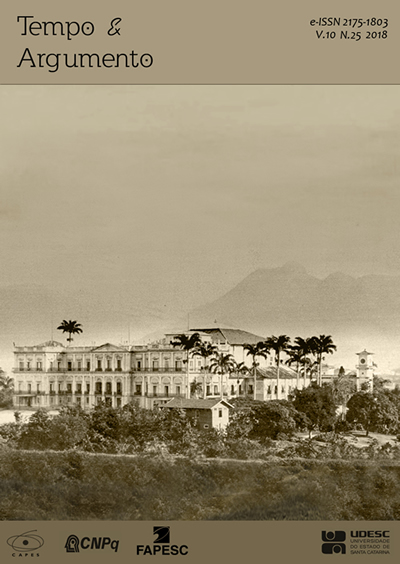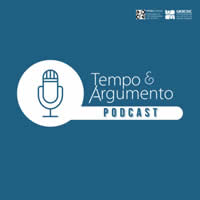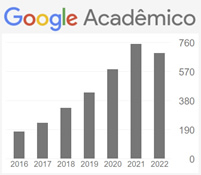Trauma, história e luto: a perlaboração da violência
DOI:
https://doi.org/10.5965/2175180310252018289Resumen
Dar-se-á aqui atenção à dinâmica do reconhecimento de certos eventos traumáticos, de processos sociais de exteriorização – e historicização – da violência traumática à perlaboração do passado. Logo, assinalar-se-ão os pontos fundamentais, tensões e limites à compreensão do que marca a estrutura de significado do trauma em nível psicológico e sociocultural. Desse modo, faz-se necessário averiguar os estudos sobre as implicações teóricas dos conceitos psicanalíticos de perlaboração, trauma e luto, ao esforço de representação e superação de uma experiência de violência pretérita. No centro dessas questões estão as ligações entre o trauma e as possibilidades (dilemas) da representação narrativa. Tais questões são cruciais para o entendimento dos debates sobre os esforços compreensivos de explicação e representação de algumas das questões mais urgentes com relação à construção do significado histórico e com relação à consolidação de uma sociedade marcada pelos efeitos duradouros e permanentes dos traumas das injustiças pretéritas. Esses dilemas, por representarem uma ameaça à significação e aos contornos da própria ação, e as demandas por reconhecimento representativo da violência e do sofrimento, cujos termos precisam ser mediados, confrontados e compreendidos como prática cultural de memória coletiva, são cruciais para a compreensão dos debates sobre a memória da violência e sua suposta transformação e recuperação.
Palavras-chave: Trauma. História. Luto. Perlaboração.
Descargas
Citas
ADORNO, Theodor. The Meaning of Working Through the Past. In: ADORNO, Theodor. Critical models. interventions and catchwords. New York: Columbia University Press, 1998.
ADORNO, Theodor. Negative dialektik. Frankfurt am Main: Suhrkamp, 1982.
ALEXANDER, Jeffrey C. Toward a theory of cultural trauma. In: ADORNO, Theodor et al. (Orgs.). Cultural trauma and collective identity. Berkeley, CA: University of California Press, 2004.
ALPHEN, Ernst Van. Symptoms of Discursivity: Experience, Memory, and Trauma. In: BAL, Mieke; CREWE, Jonathan, SPITZER, Leo (Orgs.). Acts of memory: cultural recall in the present. Hanover and London: Dartmouth College, 1999.
ANKERSMIT, Frank. Trauma and suffering: a forgotten source of western historical consciousness. In: RUSEN, Jörn (Ed.). Western historical thinking: an intercultural debate. New York, Oxford: Berghahn Books, 2002.
ANKERSMIT, Frank. Sublime historical experience. Stanford, California: Stanford University Press, 2005.
ANTZE, Paul. Telling Stories, Making Selves. Memory and Identity in Multiple Personality Disorder. In: ANTZE, Paul; Michael Lambek. (Eds.). Tense past: cultural essays in trauma and memory. New York: Routledge, 1996.
ASSMANN, Aleida. Espaço da recordação: formas e transformações da memória cultural. Campinas, SP: Editora da Unicamp, 2011.
ASSMANN, Aleida. History, Memory, and the Genre of Testimony. Poetics Today, n.27, vol.2. Porter Instititute for Poetics and Semiotics, 2006
ASSMANN, Jan; CZAPLICKA, John. Collective memory and cultural identity. New German Critique,Cultural History/Cultural Studies, n.65, 1995.
BAL, Mieke. Introduction. In: BAL, Mieke; CREWE, Jonathan; SPITZE, Leo (Orgs.). Acts of memory: cultural recall in the present. Hanover and London: Dartmouth College, 1999.
BALL, Karyn. Introduction: trauma and its institutional destines. Cultural Critique, University of Minnesota Press, n.46, 2000.
BECKER, David. Dealing with the consequences of organized violence in trauma work. In: BERGHOF handbook for conflict transformation. Berghof Research Center for Constructive Conflict Management, 2001. p.03-30
BEZERRA DE MENESES, Ulpiano. A História, cativa da memória? para um mapeamento da memória no campo das ciências sociais. São Paulo. Revista do Instituto de Estudos Brasileiros, n.34, p.15, 1992
BLUSTEIN, Jeffrey. The moral demands of memory. Cambridge: Cambridge University Press, 2008.
BOOTH, James. Communities of Memory: On Identity, Memory, and Debt. The American Political Science Review, American Political Science Association, v.93, n.02, 1999.
BRISON, Susan J. Trauma Narratives and the Remaking of the Self. In:BAL, Mieke; CREWE, Jonathan; SPITZE, Leo (Orgs.). Acts of memory: cultural recall in the present. Hanover and London: Dartmouth College, 1999.
CARUTH, Cathy. Unclaimed experience: trauma, narrative, and history. Baltimore and London: The Johns Hopkins University Press, 1996.
CARUTH, Cathy. Trauma: explorations in memory. Baltimore and London: The Johns Hopkins University Press, 1995.
DUNKER, Christian Ingo Lenz. Mal-estar, sofrimento e sintoma: uma psicopatologia do Brasil entre muros. São Paulo: Boitempo, 2015.
ERIKSON, Kai. Notes on Trauma and Community. In. CARUTH, Cathy (Org.). Trauma: explorations in memory. Baltimore and London: The Johns Hopkins University Press, 1995.
FEINDT, Gregor et al. Entangled Memory: Toward a Third Wave in Memory Studies. History and Theory, Wesleyan University, v.53, 2014.
FOGU, Claudio; KANSTEINER, Wulf. The politics of memory and the poetics of history. In: LEBOW, Richard Ned et al. (Orgs.). The politics of memory in postwar Europe. Durham: Duke University Press, 2006.
FREUD, Sigmund. Jenseits des Lustprinzips. In: MITSCHERLICH, Alexander; RICHARDS, Angela; STRACHEY, James (Orgs.). Psychologie des unbewussten (Band III). Frankfurt: S. Fischer Verlag GmbH, 1975a.
FREUD, Sigmund Erinnern, wiederholen und durcharbeiten. In: MITSCHERLICH, Alexander; RICHARDS, Angela; STRACHEY, James (Orgs.) Schriften zur Behandlungstechnik. Frankfurt: S. Fischer Verlag GmbH, 1975b.
FREUD, Sigmund Über Psychotherapie. In: MITSCHERLICH, Alexander; RICHARDS, Angela; STRACHEY, James (Orgs.) Schriften zur behandlungstechnik. Frankfurt: S. Fischer Verlag GmbH, 1975c.
FREUD, Sigmund Trauer und Melancholie (1917 [1915]). In: MITSCHERLICH, Alexander; RICHARDS, Angela; STRACHEY, James (Orgs.). Psychologie des Unbewussten (Band III). Frankfurt: S. Fischer Verlag GmbH, 1975d.
FREUD, Sigmund Massenpsychologie und Ich-Analyse (1921). In: MITSCHERLICH, Alexander; RICHARDS, Angela; STRACHEY, James (Orgs.). Fragen der gesellschaft ursprünge der religion. Frankfurt: S. Fischer Verlag GmbH, 1974.
FREUD, Sigmund Vorlesungen zur Einführung in die Psychoanalyse (1916-1917). In: MITSCHERLICH, Alexander; RICHARDS, Angela; STRACHEY, James (Orgs.). Vorlesungen zur Einführung in die psychoanalyse und neue folge (Band I). Frankfurt: S. Fischer Verlag GmbH, 1969.
FREUD, Sigmund Das interesse an der psychoanalyse (1913). In. GESAMMELTE Schriften (Band IV). Zur Psychopathologie des Alltagslebens / Das Interesse an der Psychoanalyse / Über Psychoanalyse / Zur Geschichte der Psychoanalytischen Bewegung. Leipzig; Wien; Zürich: Internationaler Psychoanalytischer Verlag, 1924.
FRIEDÄNDER, Saul. Memory, history, and the extermination of the jews of Europe. Bloomington and Indianapolis: Indiana University Press, 1993.
FÜLÖP, Éva; LÁSZLÓ, János. Emotional Processes in Elaborating a Historical Trauma in the Daily Press. In: CABECINHAS, R.; ABADIA, L. (Orgs.). Narratives and social memory: theoretical and methodological approaches. Braga: University of Minho, 2013.
FUNKENSTEIN, Amos. Collective Memory and Historical Consciousness. History and Memory, Indiana University Press, v.1, n.1, p.05-26, 1989.
GINZBURG, Jaime. Crítica em tempos de violência. São Paulo: Editora da Universidade de São Paulo, Fapesp, 2012.
HALBWACHS, Maurice. On collective memory. London and Chicago: The University of Chicago Press, 1992.
JELIN, Elizabeth. State repression and the labors of memory. Minneapolis: University of Minnesota Press, 2003.
KANSTEINER, Wulf. Finding Meaning in Memory: a Methodological Critique of Collective Memory Studies. History and Theory, Wiley for Wesleyan University, v.41, n.2., 2002.
KEHL, Maria Rita. O Tempo e o cão: a atualidade das depressões. São Paulo: Boitempo, 2009.
KLEIN, Kerwin Lee. On the emergence of memory in historical discourse. Representations, Special Issue: Grounds for Remembering. University of California Press, n.69, 2000.
KOSELLECK, Reinhard. Formen und Traditionen des negativen Gedächtnisse. In. KNIGGE, Volkhard; FREI, Norbert (Orgs.)Verbrechen erinnern: die auseinandersetzung mit holocaust und völkermord. Boon: Bundeszentrale für politische Bildung, 2005.
KOSELLECK, Reinhard. The practice of conceptual history: timing history, spacing concepts. stanford, California: Stanford University Press, 2002.
LACAPRA, Dominick. Trauma, history, memory, identity: what remains? History and Theory Wesleyan University, 55, p.375-400., 2016.
LACAPRA, Dominick. Historical and literary approaches to the “final solution”: Saul Friedländer and Jonathan Little. History and Theory, Wesleyan University, n.50., 2011.
LACAPRA, Dominick. Writing history, writing trauma. Baltimore and London: The Johns Hopkins University Press, 2001.
LACAPRA, Dominick. History and memory after auschwitz. Ithaca and London: Cornell University Press, 1998.
LÜBBE, Hermann. Esquecimento e historicização da memoria. Estudos Históricos. Rio de Janeiro, v.29, n.57, p.285-300, 2016.
MAIER, Charles S. A Surfeit of memory? reflections on history, melancholy and denial. History and Memory: Studies in Representation of the Past, v.5, n.2, p.135-152, 1993.
MEGILL, Allan. Historical knowledge, historical error: a contemporary guide to practice. Chicago: University of Chicago Press, 2007.
NORA, Pierre. Between memory and history: les lieux de mémoire. Representations 26, Spring, p.07-25, 1989.
OLICK, Jeffrey K. The politics of regret: on collective memory and historical responsibility. New York, London: Routledge, 2007.
ORTEGA, Francisco. El Trauma Social como Campo de Estúdios. In. ORTEGA, Francisco (Org.) Trauma, cultura e historia: reflexiones interdisciplinarias para el nuevo milenio. Bogotá: Universidad Nacional de Colombia. Facultad de Ciencias Humanas. Centro de Estudios Sociales, 2011.
ORTEGA, Francisco. A. La ética de la historia: una imposible memoria de lo que olvida. Desde el Jardín de Freud, n.04. Bogotá, 2004.
RICHARD, Nelly. Políticas da memória e técnicas do esquecimento. In: MIRANDA, Wander Melo (Org.). Narrativas da modernidade. Belo Horizonte: Autêntica, 1999.
RICOEUR, Paul. Tempo e narrativa (Volume III). São Paulo: Editora WMF Martins Fontes, 2010a.
RICOEUR, Paul. Escritos e conferências 1 em torno da psicanálise. São Paulo: Edições Loyola, 2010b.
RICOEUR, Paul. A memória, a história, o esquecimento. Campinas: Editora da Unicamp, 2007.
ROTH, Michael S. Memory, trauma, and history: essays on living with the past. New York: Columbia University Press, 2012.
ROTH, Michael S. Freud's Use and Abuse of the Past. In. ROTH, Michael S. (Ed.) Rediscovering history: culture, politics, and the psyche. Stanford, California: Stanford University Press, 1994.
ROUDINESCO, Elisabeth; PLON, Michel. Dicionário de psicanálise. Rio de Janeiro: Zahar, 1998.
RÜSEN, Jörn. Cultura faz sentido: orientações entre o ontem e o amanhã. Petrópolis, RJ: Vozes, 2014.
RÜSEN, Jörn. Using history: the struggle over traumatic experiences of the past in historical culture. Historein, v.11. 2011.
RÜSEN, Jörn. Como dar sentido ao passado: questões relevantes de meta-história. História da historiografia, n.02, p.163-209, 2009.
RÜSEN, Jörn Mourning by history. ideas of a new element in historical thinking. Historiography East and West, Koninklijke Brill NV: Leiden, v.1, n.1, p.13-38. 2003a.
RÜSEN, Jörn Kann gestern besser werden? Zum Bedenken der Geschichte. Berlin: Kulturverlag Kadmos, 2003b.
RÜSEN, Jörn Introduction. Historical thinking as intercultural discourse. In. RUSEN, Jörn (Ed.). Western historical thinking: an intercultural debate. New York, Oxford: Berghahn Books, 2002.
SMELSER, Neil J. Psychological trauma and cultural trauma. In. CULTURAL Trauma and Collective Identity. University of California Press: Berkeley, Los Angeles, London. 2004.
SPIEGEL, Gabrielle M. Memory and history: liturgical time and historical time. History and Theory, Wiley for Wesleyan University, v.41, n.02, p,149-162, 2002.
TODOROV, Tzvetan. Memory as a remedy for evil. London: Seagull Books, 2010.
TODOROV, Tzvetan. Memória do mal, tentação do bem. São Paulo: Arx, 2002.





